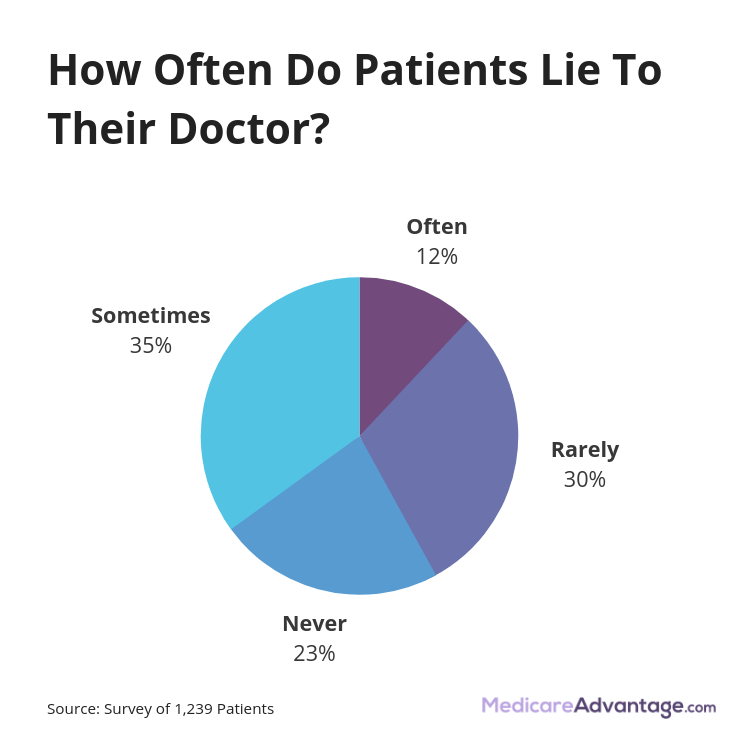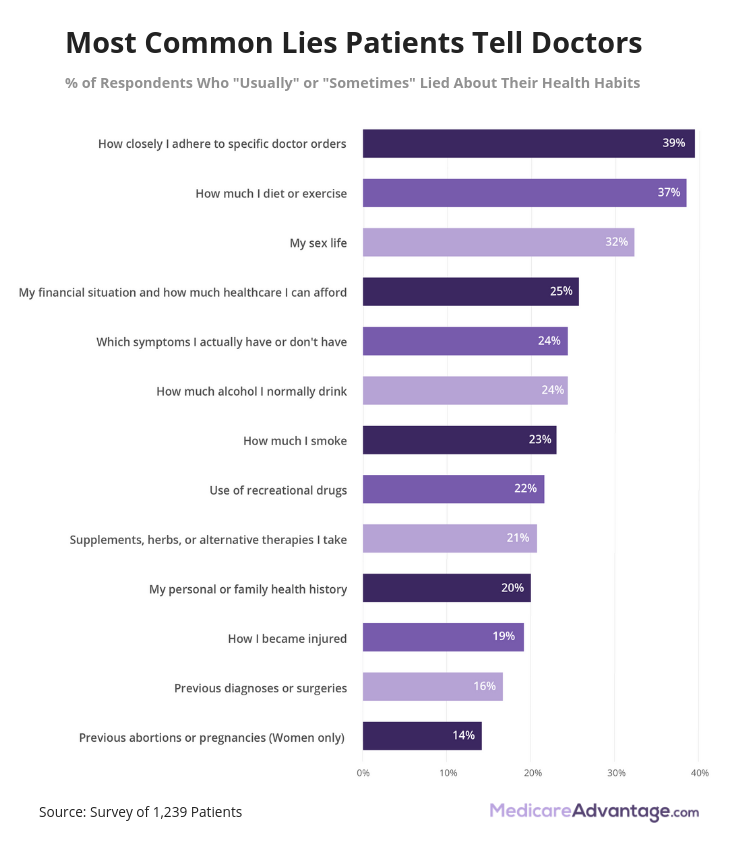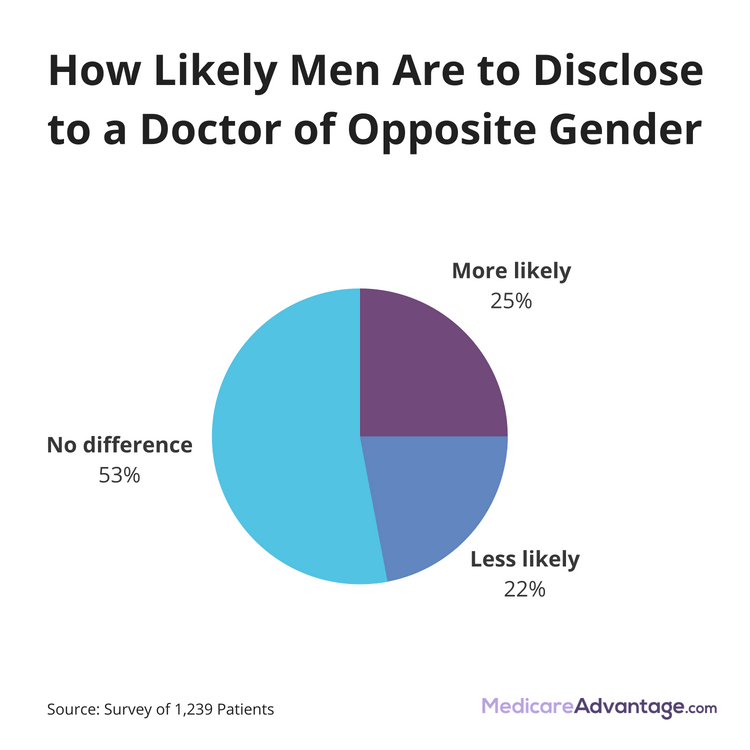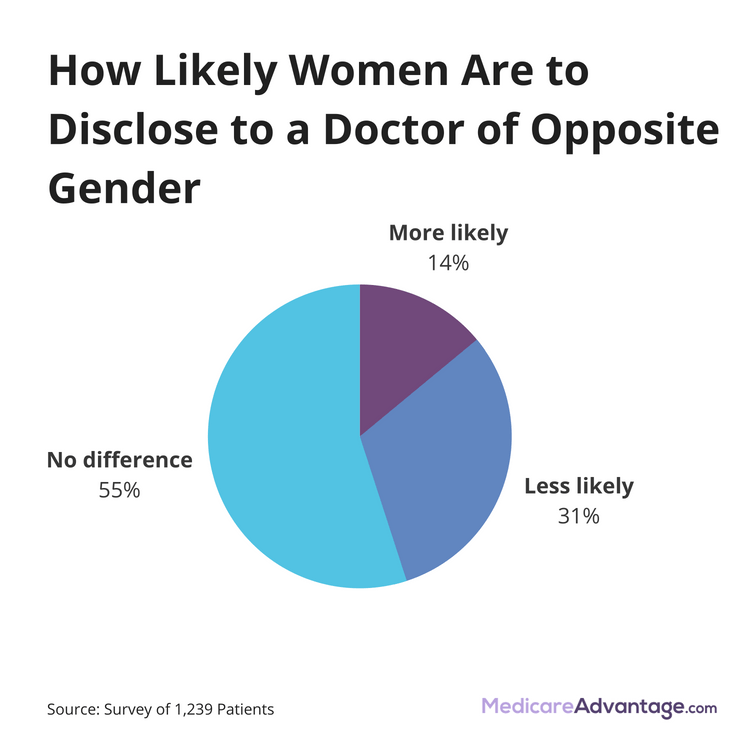The Lies Patients and Doctors Tell
A New Patient-Doctor Communication Study
August 2018
Would you lie to your doctor? According to our study, you probably already have. We surveyed more than 1,200 people to determine how honest patients are with their physicians. We found that not only do patients lie, but they do so often and for a variety of reasons.
Key results:
- 47% of patients lie to their doctor.
- The top 3 issues patients lie about are following doctors orders, their diet/exercise and sex life.
- Embarrassment is the biggest reason for lying.
- Patients are more than twice as likely to tell the truth to an older doctor.
- Women are 16% less likely to tell the truth to a male doctor, while men are 30% more likely to tell the truth to a female doctor.
Nearly half of patients omit information from their doctor
In all, 47% of patients surveyed admitted to “sometimes” or “often” lying to a doctor. And around only one in four patients surveyed claimed they had “never” omitted information from a doctor.
“So that would mean that of the 20 patients I see a day, about 10 of them have lied to me,” says an only semi-surprised Dr. Isabel Valdez of the Baylor College of Medicine. “That sounds pretty much right.”

The lies come in all forms, from little white lies to bending the truth to not telling the whole story. But are patients alone to blame? At least one doctor thinks otherwise.
“I believe physicians may contribute to the problem,” says Dr. Marícela P. Moffitt, Director of the Doctoring Curriculum at University of Arizona College of Medicine – Phoenix. “If we asked leading questions like ‘You don’t do a certain behavior do you?’ Most patients are going to respond that they don’t. Or ‘You are taking your medications as directed, aren’t you?’ Patients will give the response they think the doctor wants.”
Diet, exercise, sex life and following doctor’s orders are most common lies
The thing patients most often lie about to their doctor is how closely they adhere to specific doctor orders (38%).
In health care terms, patients who don’t follow their doctor’s orders are known as “noncompliant.” These are the patients who continue to smoke while being treated for lung disease, or who continue to drink soda after being diagnosed with diabetes, for example. These patients then often require further and more intensive treatment later on as their condition worsens.
Noncompliant patients have a devastating effect on the U.S. health care system. Research shows that patients who do not take their medications as prescribed cost around $290 billion per year in avoidable medical spending, or roughly 13% of all health care costs.1
At least one person who may not be surprised by that figure is Dr. Nina Lum, a Kentucky family medicine hospitalist and co-author of The Chronicles of Women in White Coats.
“Across all specialties, medication compliance seems to be a very popular area where people may withhold information for the fear of ‘letting their doctor down’ or shame of not being proactive about their health and wellness,” Lum says.

Besides not following doctor’s orders, the next most common lies involve a patient’s diet and exercise (37%) and their sex life (32%). Not far behind were alcohol consumption (24%), smoking (23%) and use of recreational drugs (22%).
Dr. R.J. Oenbrink, who specializes in the medical treatment of drug addiction at the Appalachian Wellness Center in Asheville, NC, is familiar with patients who have a history of drug abuse.
“Honesty is not something I always expect,” Oenbrink says. “The simple fact of the matter is that addiction is a terminal illness that kills a lot of people every year. It’s hard to get the person to develop trust in the person that they may be trying to scam drugs from. Dishonest folks are not prone to easily trusting others.”
Embarrassment is the most common reason for deceit
The most common reason why patients lie has nothing to do with feelings of letting down their doctor or an attempt to scam drugs. It’s just simple embarrassment.
Exactly half of survey respondents who admitted lying to a doctor did so out of sheer embarrassment. This was considerably more than the next most common reason of “Too complicated or not worth it to explain,” which 30% of respondents gave as their reason for lying.
“It’s fairly common for persons to withhold information when it falls under the categories where preconceived societal taboos are most prevalent,” Lum says. “These include sexual, social, lifestyle or nutritional history.”
“Patients lie for a variety of reasons. I am not condoning this, but patients do not want to look bad. No one wants to be judged.” - Dr. Marcíela Moffitt, University of Arizona College of Medicine - Phoenix
Gender preferences: Women more likely to lie to a doctor of the opposite sex
Gender seems to play a direct role in the patient-doctor relationship. According to the survey findings, female patients are 16% less likely to tell the truth to a male doctor than a female doctor. Meanwhile, male patients are 30% more likely to tell the truth to a female doctor than a male doctor.
When it came to overall lying, however, men were found to be more likely to lie to a doctor than women. Men are 27% more likely than women to lie about drug use and 25% more likely to lie about the source of an injury.


Age matters
Another dynamic of the patient-doctor relationship is age. Overall, older patients were found to be more truthful with their doctors, with only 18% of respondents over the age of 64 admitting to lying to a doctor. Across the board, honesty generally increased with age.
It wasn’t just older patients who were found to be more truthful either. Older doctors were found to be more trusted by patients. Patients of all ages were more than twice as likely to tell the truth to an older doctor than to a younger one.
On the surface, it may seem predictable that a patient would be more trusting of an older and more experienced doctor. But a notable Harvard study suggests patients may be wiser to place their trust in younger doctors. The study of more than 700,000 patients age 65 and older revealed the mortality rate increased with the age of those patients’ doctors.2
Most believe their doctor doesn’t detect their lies
Patients aren’t just lying to their doctor, they are lying to themselves. 70% of women and 65% of men report being confident that their doctor does not know when they lie. But there’s one problem for patients who are harboring the truth: lab results.
“I sometimes call my blood work my lie detector test.” – Dr. Isabel Valdez, Baylor College of Medicine
“If a patient tells me ‘Yeah I’ve been taking my medicine, I’ve been exercising, I’m dieting’ and their A1C (a blood test that determines blood sugar levels) goes up within the last three months I say ‘Well, according to your lie detector test, that may not be entirely true,” Valdez says.When patients fill out a pre-appointment questionnaire, they are typically asked about alcohol consumption, diet, exercise, medication use and more. When the answers given aren’t consistent with the results of ensuing blood work, the doctor can typically spot the lie.
“If I think a patient is not giving me the truth about something relevant to their care, I will tell them about the importance of being truthful since their health is at stake,” Moffitt says.
The effects of lying to a doctor
The financial burden caused by non-compliant patients is only one effect of lying to a doctor. Other consequences can be much more devastating.
The third-leading cause of death in the U.S. (after heart disease and cancer) is medical errors, such as incorrect dosages or inappropriate prescriptions, many of which could be the result of a patient’s dishonesty.3
“(Patients) may not realize that by them not being forthright, we could actually give them a medication that could hurt them or interact poorly,” Valdez says. In fact, poor medication compliance can be blamed for approximately 125,000 deaths every year in the U.S.1
Sexually transmitted diseases are another area where the embarrassment of lying should be outweighed by the consequences of doing so. Appropriate screening for STDs may not always be administered if a patient omits information about high-risk behaviors. Many STDs can persist for years with no symptoms, and the combination of no symptoms plus no testing can result in an increased spread of infection.
“Every question posed during the typical doctor-patient encounter carries clinical significance.” – Dr. Nina Lum, Family Medicine Doctor
“In this case, the physician may not become aware of a significant problem until the consequences become severe. Early detection, treatment and intervention is important for care to be effective and this cannot occur if transparency does not exist,” says Christian J. Whitney, an anesthesiologist and pain management consultant in Greenwich, CT.Another effect of patient dishonesty is a decreased opportunity for early detection that can be the key to fighting off so many health issues.
Lying to a doctor can also make it difficult for the physician to make a correct diagnosis.
“Misinformation or omission can typically cause the physician to search for unrelated disease states,” says Lum. “Honesty from a patient reduces the time lag from the time of patient presentation to the time of the correct diagnosis. It also increases the likelihood of obtaining the correct diagnosis and subsequent accurate treatment in a timely manner.”
Given the dangers of lying to a doctor, one finding from our result stood out as particularly troubling: 58% of patients who lied to their doctor didn’t believe their lie affected the quality of care they received or the outcome of their appointment.
Do doctors lie to patients, too?
Of course, it wouldn’t be fair to suggest that this medical dishonesty is completely one sided. Doctors are not always entirely truthful with patients either, although for very different reasons. A 2012 study of nearly 1,900 physicians published by Health Affairs⁴ found that:
- One-third of doctors felt that they shouldn’t share serious medical errors with a patient.
- Nearly 40% of doctors surveyed did not disclose to patients their financial relationship with drug or medical device companies.
- More than 55% of doctors said they often or sometimes describe a patient's condition in a more positive light than what the facts suggest.
These results stand in stark contrast to annual Gallup polls which show medical professionals as being among the most trusted individuals, outranking such professions as police officers, judges and day care providers.4
Nobody will have an easy time delivering news of a terminal illness, and doctors are no exception. Dr. Moffitt recalls leading an exercise with her medical students who had to practice disclosing a terminal diagnosis to patients.
“In the debrief at the end of the session, students shared how hard it was to be truthful and how afraid they were that they would cry in the room with the patient,” she said.
“The honesty with patients is just as hard for physicians when it comes to delivering bad news.” – Dr. Marícela P. Moffitt, University of Arizona College of Medicine – Phoenix
“If a patient comes in with a positive STD test and they’ve been married for three years or 10 years or however many years, you’d rather just say ‘Oh maybe you’ve just had it (all along),” Valdez says. “You don’t want to have that difficult conversation with your patient.”A doctor’s lie can also come in response to a lie from a patient.
Improving the doctor-patient relationship
Any healthy relationship is built on trust, and the doctor-patient dynamic should be no different. So what do physicians do to foster trust with patients, and how can patients do their part?
“In order for my patients to feel that they can be open and honest with me, I create an environment where they feel safe and are allowed to be vulnerable,” Whitney says. “I do this by not being judgmental and allowing for enough time to ask questions. I pay attention not only to my words, but also my body language. I inform them that their privacy is of utmost importance to not only myself, but also my staff and we do everything possible to safeguard their information.”
As for patients, regularly seeing your doctor and taking an active role in your health is a foundation for building trust.
“I have found that when patients are involved in their care and have a direct role, they are more likely to ask questions and follow recommendations,” Whitney says. “I take the time to explain the condition and always ask if they understand and agree with the plan.”
“If you see a doctor regularly you’ll create a relationship and an environment where they can be honest,” says Valdez. “We’re not trying to shame you because you’re doing something wrong. If you’re not able to exercise because you’re working two jobs and you’re a caregiver to your mother with Alzheimer’s, I’m not going to shame you for not exercising. But tell me that so we can work around that and find another game plan. Two heads are better than one.”
“The ability to be honest and transparent is crucial for a meaningful and effective doctor-patient relationship.” – Dr. Christian J. Whitney, Anesthesiologist
Conclusions
Based on our survey findings, we conclude that a significant number of patients lie to their doctors and that the types of lies and reasons for lying are many and varied. We may also conclude, based on our feedback from physicians and additional research, that dishonesty can be detrimental to the doctor-patient relationship and even dangerous to the patient’s well-being.
Methodology
The study was conducted in August 2018 using an online survey, via Amazon’s Mechanical Turk, of 1,239 participants (N=1,239). Participants who self-identified as a healthcare professional or who had “Never” visited a doctor were not included in the final sample. Participants ranged from ages 18-77.
- Age distribution: Men: 49%; Women: 51% (Census Matched)
- Margin of Error: +/- 2.70 %
This survey relies on self-reported data. Gender data was evaluated for self-consistency against previously provided responses; inconsistent respondents were excluded from the sample.
Fair use statement
Of course we would love for you to share our work with others. We just ask that if you do, please grant us the proper citation with a link to this study so that we may be given credit for our efforts.
Research and reports
Our research reports analyze a number of issues important to seniors, from health perceptions, medical communication, health habits, and more.
Acknowledgements
Isabel Valdez, MPAS, PA-C, CPAAPA, Instructor and FCM-Clinical Private Practice, Baylor College of Medicine
Marícela P. Moffitt, MD, MPH, FACP, Director, Doctoring Curriculum, University of Arizona College of Medicine – Phoenix
Nina Lum, MD, Co-Author, “The Chronicles of Women in White Coats”
Raymond Joseph Oenbrink, DO, AOBFP, ABAM, Appalachian Wellness Center
Christian J. Whitney, DO, Board Certified Anesthesiologist and Pain Management Consultant
About MedicareAdvantage.com
MedicareAdvantage.com helps users explore their Medicare coverage options (such as Medicare Advantage and Medigap plans) and helps Medicare beneficiaries understand their health care benefits and costs.
